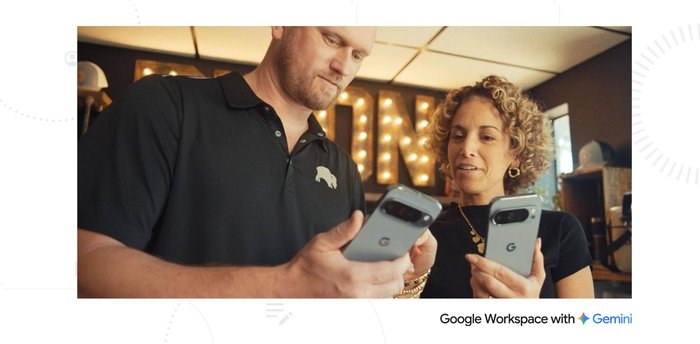3 steps to fostering a team of generative AI champions

Michael Brenzel
Chief Workspace Evangelist, Google Workspace
Google Workspace Newsletter
Keep up with the evolving future of work and collaboration with insights, trends, and product news.
SIGN UPSince we launched Gemini for Google Workspace, I’ve noticed that some businesses are more effective than others at building enthusiasm for generative AI projects. The reason is simple: Successful organizations deploy teams of in-house champions to accelerate large-scale adoption of tools like Gemini for Google Workspace.
Why it matters:
Champions can be the key to quickly transforming your business and delivering a higher return on employee with gen AI. I’ve seen firsthand how AI enthusiasts motivate and support colleagues as they integrate Gen AI into teams and workflows throughout an organization. After all, the best influencer is a coworker people know and trust. They can explain the game-changing potential of AI tools in a way that no vendor can.
Champions also understand the business case for gen AI. They see how it increases productivity and gives their coworkers more time for high-value tasks. Plus, I’ve found that champions bring the added bonus of creating a culture of creativity, collaboration, and fun.
Here are three steps for building a team of gen AI champions.
1. Gather a team of passionate and experienced volunteers — including your execs
Get buy-in from your executive team early and often. Including execs as early adopters or testers of generative AI can help grow momentum and prevent road blocks.
Ask for volunteers from every business unit so no team is left behind. That way, results from a gen AI pilot won’t come with the objection, “that would never work on my team.”
Select natural storytellers and teachers to communicate how Gen AI can improve the day-to-day employee experience.
Tap a few individuals and leaders who have already driven alignment for complex projects across your organization.


Natural teachers and storytellers can help make AI more approachable for everyone.
2. Support your teams and users at every level
Embed support throughout your organization to address resistance to change. When users get frustrated with new tools, they’re more likely to stop using them. How can you ensure that friendly and knowledgeable support is just an email, chat, or call away?
When Pepperdine University launched a change management program to address questions and concerns, champions delivered support — and doughnuts! — as they introduced Gemini into their organization. They worked their way through each department, sharing Gemini training tools, words of encouragement, and tasty snacks.


Offer accessible and comprehensive support to encourage the adoption of new tools.
3. Create community to drive engagement
A community of passionate and knowledgeable users is a sure recipe for success with generative AI. Even after the pilot is over, keep your team of champions engaged over the long term. You might also consider:
Keeping stakeholders updated about the latest initiatives with a monthly newsletter.
Keeping projects on track and helping teams make progress with regular check-ins or office hours.
Training teams on new gen AI capabilities. Tools like Google Vids (now in Workspace Labs), one of my personal favorites, can help your team create training videos in minutes. You can also encourage teams to collaborate using dedicated spaces in Google Chat.
Rewarding your team of champions in creative ways. Consider assigning special titles or digital badges, and delivering personalized swag to these power users — and don’t forget to recognize their work in year-end reviews.
Maintain momentum
It takes time to fully integrate AI tools and transform your organization. A team of engaged AI champions could be just what you need to kickstart the process. But their role doesn’t end there. Host ongoing training sessions to educate new employees and update teams on the latest Gemini features. Implementing AI is a process, not a destination.
Learn more about Gemini for Google Workspace, or check out Beyond the prompt round-up: Our series on getting the best out of generative AI.



